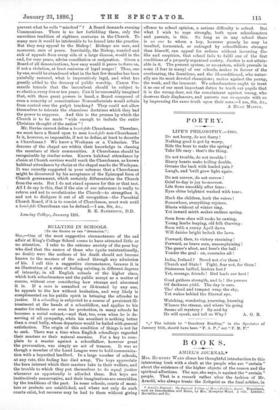BULLYING IN SCHOOLS.
FTO THE EDITOU OF THE " SPECTATOR." _I
SIR,—One of the most suggestive circumstances of the sad affair at King's College School seems to have attracted little or no attention. I refer to the extreme anxiety of the poor boy who died that the names of those who (quite unintentionally, no doubt) were the authors of his death should not become known to the masters of the school through any admission of his. I call this a suggestive circumstance, because it is an illustration of a state of feeling existing, in different degrees of intensity, in all English schools of the higher class, which both schoolmasters and the public accept as a matter of -course, without ever considering how strange and abnormal it is. If a man is assaulted or ill-treated by any one, he appeals to the law without hesitation, and very likely is -complimented on his public spirit in bringing the offender to justice. If a schoolboy is subjected to a course of persistent ill- treatment at the hands of a schoolfellow, and applies to his master for redress or even for protection, in many schools he becomes a social outcast,—and that, too, even when he is de- serving of all sympathy, while his assailant is nothing better than a cruel bully, whose departure would be hailed with general satisfaction. The origin of this condition of things is not far to seek. There was a time when English schoolboys regarded their masters as their natural enemies. For a boy to com- plain to a master against a schoolfellow, however great the provocation, was simply an act of treason. It was as though a member of the Laud League were to hold communica- tion with a boycotted landlord. In a large number of schools, at any rate, this feeling has died away. The boys appreciate the keen interest which their masters take in their welfare, and the trouble to which they put themselves to do equal justice whenever an opportunity is afforded them. But boys are instinctively conservative, and their imaginations are overridden by the traditions of the past. In some schools, courts of moni- tors or prefects are established, and where not only do such courts exist, but recourse may be had to them without giving offence to school opinion, a serious difficulty is solved. But what I wish to urge strongly, both upon schoolmasters and parents, is this. So long as in any school there is no one to whom a boy, however grossly he may be insulted, tormented, or outraged by schoolfellows stronger than himself, can appeal for redress without incurring dis- like and suspicion, that school fails to fulfil one of the first conditions of a properly organised society. Justice is not attain- able in it. The present system, or no-system, which prevails in some (I fear in many) of our schools, makes in favour of the overbearing, the licentious, and the ill-conditioned, who natur- ally are its most devoted champions ; makes against the young, the weak, and the innocent. We schoolmasters ought to treat it as one of our most important duties to teach oar pupils that it is the wrong-doer, not the complainant against wrong, who deserves their displeasure, and parents can co-operate with us by impressing the same truth upon their sons.—I am, Sir, &c., A HEAD MASTER.


































 Previous page
Previous page